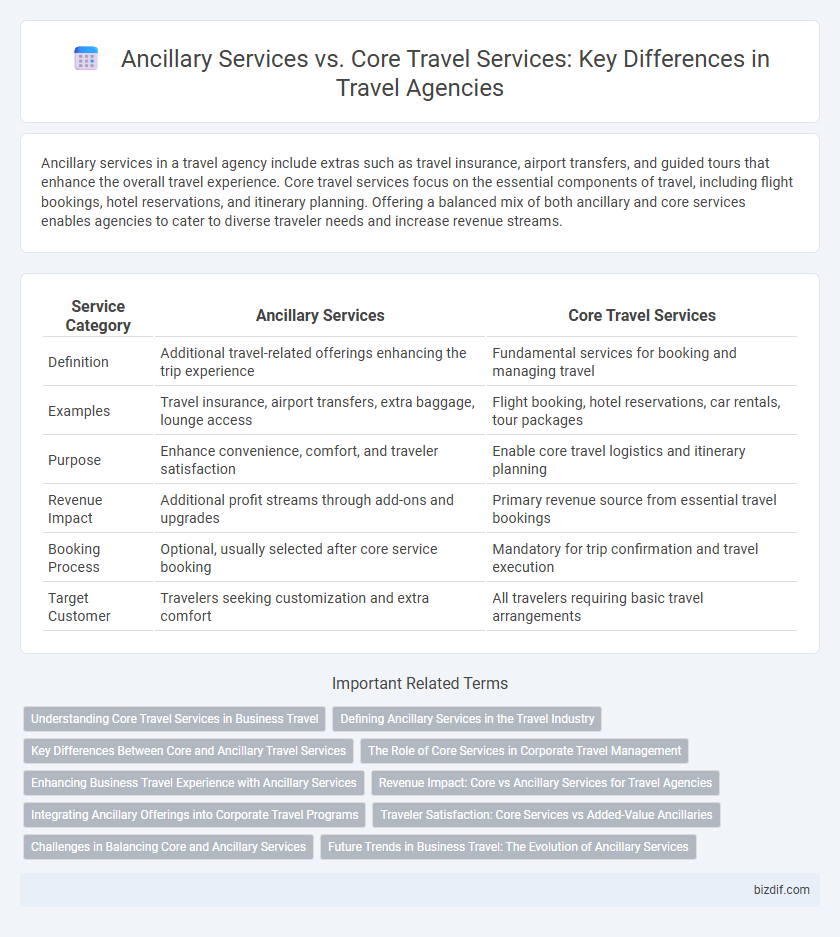Ancillary services in a travel agency include extras such as travel insurance, airport transfers, and guided tours that enhance the overall travel experience. Core travel services focus on the essential components of travel, including flight bookings, hotel reservations, and itinerary planning. Offering a balanced mix of both ancillary and core services enables agencies to cater to diverse traveler needs and increase revenue streams.
Table of Comparison
| Service Category | Ancillary Services | Core Travel Services |
|---|---|---|
| Definition | Additional travel-related offerings enhancing the trip experience | Fundamental services for booking and managing travel |
| Examples | Travel insurance, airport transfers, extra baggage, lounge access | Flight booking, hotel reservations, car rentals, tour packages |
| Purpose | Enhance convenience, comfort, and traveler satisfaction | Enable core travel logistics and itinerary planning |
| Revenue Impact | Additional profit streams through add-ons and upgrades | Primary revenue source from essential travel bookings |
| Booking Process | Optional, usually selected after core service booking | Mandatory for trip confirmation and travel execution |
| Target Customer | Travelers seeking customization and extra comfort | All travelers requiring basic travel arrangements |
Understanding Core Travel Services in Business Travel
Core travel services in business travel include essential offerings such as airfare booking, hotel accommodations, and ground transportation arrangements that facilitate the primary purpose of the trip. These services ensure seamless logistics and time efficiency critical for corporate travelers attending meetings, conferences, or client visits. Understanding these foundational elements enables travel agencies to streamline business travel plans and enhance overall client satisfaction through tailored solutions.
Defining Ancillary Services in the Travel Industry
Ancillary services in the travel industry refer to supplementary offerings that enhance the core travel experience, such as baggage handling, in-flight meals, airport transfers, travel insurance, and guided tours. These services generate additional revenue streams beyond the primary travel products like flights, hotels, and car rentals. By providing customizable options, travel agencies cater to diverse customer preferences and improve overall satisfaction while boosting profitability.
Key Differences Between Core and Ancillary Travel Services
Core travel services include primary offerings such as flight bookings, hotel accommodations, and car rentals, which form the foundation of a travel agency's business. Ancillary services encompass supplementary options like travel insurance, airport transfers, guided tours, and meal packages that enhance the overall travel experience. The key differences lie in their purpose and revenue model: core services fulfill essential travel needs, while ancillary services provide added value and generate additional income streams for agencies.
The Role of Core Services in Corporate Travel Management
Core travel services such as flight bookings, accommodations, and ground transportation form the foundational elements of corporate travel management, ensuring efficiency and cost control for business travelers. These services are essential for meeting organizational travel policies and optimizing travel schedules, directly impacting employee productivity and expense management. Ancillary services, while valuable for enhancing traveler experience, depend on the reliable execution of core services to support seamless corporate travel operations.
Enhancing Business Travel Experience with Ancillary Services
Ancillary services, such as airport transfers, travel insurance, and lounge access, significantly enhance the core travel experience by providing convenience and comfort to business travelers. These additional offerings streamline itineraries, reduce travel-related stress, and improve productivity during trips. Incorporating tailored ancillary services allows travel agencies to create comprehensive travel solutions that meet the specific needs of corporate clients.
Revenue Impact: Core vs Ancillary Services for Travel Agencies
Core travel services such as flight bookings, hotel reservations, and package tours generate the primary revenue stream for travel agencies, often representing the largest share of sales volume. Ancillary services including travel insurance, airport transfers, and guided excursions contribute significantly to profit margins by offering higher commission rates and enhancing customer experience. Effective integration of ancillary services can boost overall revenue by up to 30%, making them a critical factor in maximizing travel agency profitability.
Integrating Ancillary Offerings into Corporate Travel Programs
Integrating ancillary offerings such as airport transfers, travel insurance, and lounge access into corporate travel programs enhances employee experience and optimizes travel budgets. Corporate travel managers can leverage data analytics to tailor ancillary services that align with business travel policies and streamline expense management. Prioritizing ancillary services within core travel bookings improves overall traveler satisfaction and drives cost efficiencies.
Traveler Satisfaction: Core Services vs Added-Value Ancillaries
Traveler satisfaction in the travel industry hinges on both core travel services and ancillary offerings, where core services such as flight booking, accommodation, and transportation form the essential travel experience foundation. Ancillary services like travel insurance, guided tours, and airport lounge access enhance the journey by adding convenience, comfort, and personalized options that meet diverse traveler needs. Prioritizing a balance between reliable core services and value-added ancillaries drives higher overall satisfaction and loyalty among travelers.
Challenges in Balancing Core and Ancillary Services
Balancing core travel services such as flight bookings and hotel reservations with ancillary services like travel insurance, guided tours, and luggage handling presents significant challenges for travel agencies. Core services require reliability and competitive pricing to attract customers, while ancillary services demand personalized offerings and seamless integration to enhance customer experience and generate additional revenue. Striking the right balance involves optimizing resource allocation and technology platforms to ensure both service types complement each other without compromising quality or profitability.
Future Trends in Business Travel: The Evolution of Ancillary Services
Future trends in business travel highlight the rapid evolution of ancillary services, shifting from mere add-ons to essential components that enhance traveler experience and operational efficiency. Advanced technologies such as AI-powered personalized recommendations, seamless mobile integrations, and dynamic pricing models are driving the growth of ancillary offerings like travel insurance, airport transfers, and in-flight connectivity. Travel agencies leveraging these innovations can provide tailored packages that meet evolving corporate needs, boosting customer satisfaction and generating new revenue streams beyond core travel bookings.
Ancillary services vs Core travel services Infographic

 bizdif.com
bizdif.com